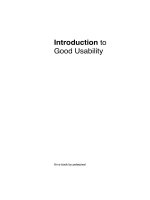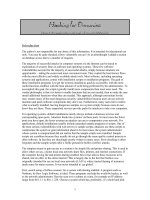When Bad Grammar Happens to Good People
Bạn đang xem bản rút gọn của tài liệu. Xem và tải ngay bản đầy đủ của tài liệu tại đây (4.43 MB, 256 trang )
B
AD
Grammar
Happens
G
OOD
People
When
to
H
OW
TO
A
VOID
C
OMMON
E
RRORS
IN
E
NGLISH
A
NN
B
ATKO
Edited by Edward Rosenheim
Franklin Lakes, NJ
a Bad Grammar Front.pmd 3/17/2004, 9:44 AM1
Copyright 2004 by Vocab Incorporated
All rights reserved under the Pan-American and International
Copyright Conventions. This book may not be reproduced, in whole
or in part, in any form or by any means electronic or mechanical,
including photocopying, recording, or by any information storage
and retrieval system now known or hereafter invented, without writ-
ten permission from the publisher, The Career Press.
W
HEN
B
AD
G
RAMMAR
H
APPENS
TO
G
OOD
P
EOPLE
E
DITED
AND
T
YPESET
BY
K
RISTEN
P
ARKES
Cover design by The Visual Group
Printed in the U.S.A. by Book-mart Press
To order this title, please call toll-free 1-800-CAREER-1 (NJ and
Canada: 201-848-0310) to order using VISA or MasterCard, or for
further information on books from Career Press.
The Career Press, Inc., 3 Tice Road, PO Box 687,
Franklin Lakes, NJ 07417
www.careerpress.com
Library of Congress Cataloging-in-Publication Data
Batko, Ann.
When bad grammar happens to good people : how to avoid common
errors in English / by Ann Batko ; edited by Edward Rosenheim.
p. cm.
Includes index.
ISBN 1-56414-722-3
1. English language—Grammar—Handbooks, manuals, etc. 2. English
language—Usage—Handbooks, manuals, etc. I. Title.
PE1111.B385 2004
428.2—dc22
2003069601
a Bad Grammar Front.pmd 3/17/2004, 9:44 AM2
To my father,
who never lets go of a good idea.
b Bad Grammar Dedi.pmd 3/17/2004, 9:44 AM3
This page intentionally left blank
Acknowledgments
This book has had a long gestation. The idea was in-
spired by the chapter title “Do You Make These 100 Common
Errors in English?” taken from one of the many books written
by the late Herbert V. Prochnow, former president of the First
National Bank of Chicago.
I am indebted to Edward Rosenheim, the distinguished edi-
tor of this book, for the vision and direction he gave at critical
points in the planning and writing. I am grateful to Tracy Weiner,
associate director of the University of Chicago Writing Pro-
gram, for creating the various test sections, which provide
invaluable reinforcement and a welcome sense of humor. Bar-
bara Stufflebeem, a freelance editor and former student of
Edward Rosenheim’s, also made valuable contributions to the
manuscript.
c Bad Grammar Ackno.pmd 3/17/2004, 9:44 AM5
This page intentionally left blank
Author’s Note
Everyone has bad language habits. We hear language er-
rors on TV, at work, and even from our family—so many times
that the errors might seem correct. But they’re still errors, and
they can make us sound less sophisticated, or even less intelli-
gent, than we really are.
Fortunately, you can form new, good habits the same way
you got stuck with the bad ones: by repetition. This program
will help you do it. Here’s how:
1. Get started: Find out what you know. A pretest
that covers some of the most common language
errors is included in this book. If you get an an-
swer wrong, or if you’re just not sure why you
got it right, the pretest’s key will direct you to the
chapter—or group of related errors—that can
help.
2. Choose where to begin! The chapters are care-
fully organized in a series. The program works
best if you take the units in the order you find
them. However, they can stand alone if need be.
After you take the pretest, you may want to jump
to a particular chapter on a topic of special inter-
est to you.
d Bad Grammar Author Note.pmd 3/17/2004, 9:44 AM7
3. Practice out loud when working through a unit.
This will help train your ear to hear what is cor-
rect and to get you comfortable using language
or phrases that may feel unfamiliar or downright
wrong at first.
4. Test yourself to see how far you’ve come. Each
chapter is divided into manageable sections, and
each section ends with a test. Take a test when
you think you’ve got a handle on a section’s er-
rors. The test’s key will let you know whether
you’ve mastered the section.
5. Reinforce what you know. To make your new
knowledge a new habit, look for examples of the
things you’ve learned when you’re reading the
paper, watching TV, or listening to a conversa-
tion at work.
6. Test yourself again to make sure a good habit
stays stuck. At the end of the book you’ll find
review tests for the more complex grammatical
chapters. To find out if your good habits have
really sunk in, you might want to take a chapter’s
review tests a week or so after you feel you’ve
mastered the material. If you get it right, con-
gratulations! You’ve formed a good habit!
d Bad Grammar Author Note.pmd 3/17/2004, 9:44 AM8
Contents
Foreword 17
Introduction: How Do We Learn to Speak Correctly? 21
Pretest 27
Grammar Review 31
Chapter 1: Perplexing Pronouns 55
A Lesson on Pronoun Cases 56
Use the Subjective Case When... 57
Use the Objective Case When... 58
Use the Possessive Case When... 58
Subjective and Objective Cases 59
1. I vs. Me 59
2. She vs. Her 60
3. Who vs. Whom 61
4. Whoever vs. Whomever 62
Test: Subjective and Objective Case 63
Answer Key: Subjective and Objective Case 65
Objective and Possessive Case 67
5. His vs. Him 67
6. Their vs. Them 67
Test: Objective and Possessive Case 69
Answer Key: Objective and Possessive Case 69
e Bad Grammar Contents.pmd 3/17/2004, 9:44 AM9
Relative Pronouns: “Which,” “That,” and “Who/Whom” 71
7. Which vs. That 73
Test : Relative Pronouns 73
Answer Key: Relative Pronouns 74
Intensive or Reflexive Pronouns–What They’re for
and Where NOT to Put Them 75
8. Me vs. Myself 76
Test: Intensive and Reflexive Pronouns 76
Answer Key: Intensive and Reflexive Pronouns 77
Chapter 2: Vexing Verbs 79
Transitive and Intransitive Verbs 79
9. Lie vs. Lay 81
10. Sit vs. Set 84
Test: Transitive and Intransitive Verbs 85
Answer Key: Transitive and Intransitive Verbs 86
A Lesson on Verb Tenses 86
Forms of the Verb “to Be” Across the Six Tenses 89
“Shall” and “Will” 91
Tricky Verb Tenses 91
11. Do 91
12. Burst 92
13. Dive 93
14. Drink 93
15. Swim 94
16. Ring 94
17. Sing 95
18. Spring 95
19. Hang 96
20. Drive 96
21. Ought 97
22. Be sure and 97
23. Try and 98
Test: Tricky Verb Tenses 98
Answer Key: Tricky Verb Tenses 99
The Subjunctive Mood 100
24. If I Was vs. If I Were 102
Test: The Subjunctive 103
Answer Key: The Subjunctive 103
e Bad Grammar Contents.pmd 3/17/2004, 9:44 AM10
Chapter 3: Ambiguous Agreements 105
25. Subjects With Complex Modifiers 106
Agreement With Compound Subjects 107
26. Subjects Joined by “And” 108
27. “Either/Or” and “Neither/Nor” 109
28. Subjects Joined by “Or” 110
Test: Compound Subjects and Verbs 111
Answer Key: Compound Subjects and Verbs 112
Agreement With Indefinite Pronouns 113
29. Each…Are 113
30. None…Is/Are 114
Test: Indefinite Pronouns and Verbs 116
Answer Key: Indefinite Pronouns and Verbs 117
Indefinite Pronouns and Personal Pronouns 118
31. Everyone…Their 118
Test: Indefinite Pronouns and Personal Pronouns 120
Answer Key: Indefinite Pronouns and Personal Pronouns 121
Chapter 4: Mangled Modifiers 123
Adjectives vs. Adverbs 123
32. Bad vs. Badly 123
33. Real vs. Really 124
34. Near vs. Nearly 125
35. Good vs. Well 125
Test: Adjectives vs. Adverbs 126
Answer Key: Adjectives vs. Adverbs 127
Comparatives vs. Superlatives 127
36. Bigger vs. Biggest 127
37. Less vs. Least 128
38. Better vs. Best 128
39. More vs. Most 129
Test: Comparatives vs. Superlatives 130
Answer Key: Comparatives vs. Superlatives 130
Distance/Number/Quantity Modifiers 131
40. Between vs. Among 131
41. Fewer vs. Less 131
42. Farther vs. Further 132
43. Number vs. Amount 132
e Bad Grammar Contents.pmd 3/17/2004, 9:44 AM11
44. So far as vs. As far as 133
Test: Distance/Number/Quantity Modifiers 133
Answer Key: Distance/Number/Quantity Modifiers 134
Absolute Modifiers 135
45. Unique vs. Most Unique 135
46. Perfect vs. More Perfect 136
47. Infinite vs. Less Infinite 136
48. Ultimate vs. Penultimate 137
49. Pregnant vs. Less Pregnant 137
Test: Absolute Modifiers 138
Answer Key: Absolute Modifiers 139
Imprecise and Made-up Modifiers 139
50. Hopefully 139
51. Regretfully 140
52. Awful 141
53. Plenty 141
Test: Imprecise and Made-up Modifiers 141
Answer Key: Imprecise and Made-up Modifiers 142
Chapter 5: Problem Prepositions 143
Prepositions Expressing Fine Shades of Meaning 143
54. Agree to vs. Agree with 143
55. Differ with vs. Differ from 144
56. Different from vs. Different than 144
Test: Prepositions That Express Fine Shades of Meaning 145
Answer Key: Prepositions That Express
Fine Shades of Meaning 146
Unidiomatic and Superfluous Prepositions 146
57. Centers around 146
58. Where…at 147
59. As to 147
60. Off of 148
61. Over with 148
62. Type of a 149
Test: Unidiomatic and Superfluous Prepositions 149
Key: Unidiomatic and Superfluous Prepositions 149
Chapter 6: Confused Connections 151
Bookend Expressions 152
63. Not only…But/But also 152
e Bad Grammar Contents.pmd 3/17/2004, 9:44 AM12
64. On the one hand…On the other hand 153
65. Either…Or 154
66. Neither…Nor 154
67. As…As 154
68. The Reason…Was That 155
Test: Bookend Expressions 155
Answer Key: Bookend Expressions 156
Imprecise, Pretentious, or Needless Connectors 157
69. Where 157
70. Per 158
71. Plus 158
72. As to whether 159
73. In the event that 159
74. Owing to the fact that 160
75. As vs. Because and Since 160
Test: Imprecise Conjunctions and Connectors 160
Answer Key: Imprecise Conjunctions and Connectors 161
Chapter 7: Puzzling Plurals 163
76. Media 163
77. Data 164
78. Alumni 165
79. Criteria 166
80. Phenomena 166
81. Memoranda 167
Test: Puzzling Plurals 167
Answer Key: Puzzling Plurals 168
Chapter 8: Mixing up Words That Sound the Same 169
82. Accept vs. Except 170
83. Advice vs. Advise 170
84. Affect vs. Effect 171
85. Amoral vs. Immoral 171
86. Averse vs. Adverse 172
87. Beside vs. Besides 173
88. Biannually vs. Biennially 173
89. Climatic vs. Climactic 174
90. Could of vs. Could have 174
91. Elude vs. Allude 175
92. Imminent vs. Eminent 175
e Bad Grammar Contents.pmd 3/17/2004, 9:44 AM13
93. Ingenious vs. Ingenuous 176
94. Jibe vs. Jive 176
95. Tack vs. Tact 177
96. Tortuous vs. Torturous 177
Test: Mixing up Words That Sound the Same 178
Answer Key: Mixing up Words That Sound the Same 179
Chapter 9: Mixing up Words That Look the Same 181
97. Adapt vs. Adopt 181
98. Allusion vs. Illusion vs. Delusion 182
99. Assignment vs. Assignation 183
100. Childlike vs. Childish 183
101. Continual vs. Continuous 184
102. Creditable vs. Credible vs. Credulous 185
103. Incredible vs. Incredulous 185
104. Elegy vs. Eulogy 186
105. Epitaph vs. Epithet 186
106. Flaunt vs. Flout 187
107. Luxurious vs. Luxuriant 187
108. Morale vs. Moral 188
109. Periodic vs. Periodical 189
110. Persecute vs. Prosecute 189
111. Proceed vs. Precede 190
112. Respectful vs. Respective 190
113. Sensuous vs. Sensual 191
114. Simple vs. Simplistic 192
115. Uninterested vs. Disinterested 192
Test: Mixing up Words That Look the Same 193
Answer Key: Mixing up Words That Look the Same 195
Chapter 10: Mixing up Words
Whose Meanings Are Related 197
116. Annoy vs. Irritate vs. Aggravate 197
117. Burglary vs. Robbery 198
118. Can vs. May 199
119. Compose vs. Comprise 199
120. Convince vs. Persuade 200
121. Eager vs. Anxious 201
122. Explicit vs. Implicit 201
123. Figuratively vs. Literally vs. Virtually 202
e Bad Grammar Contents.pmd 3/17/2004, 9:44 AM14
124. Imply vs. Infer 203
125. Kind of /Sort of vs. Rather 204
126. Let vs. Leave 204
127. Like vs. As and As if 205
128. Likely vs. Apt vs. Liable 205
129. Percent vs. Percentage 206
130. Quote vs. Quotation 207
131. Semiannually vs. Semimonthly vs. Semiweekly 207
132. Serve vs. Service 208
133. Take vs. Bring 209
134. Use vs. Utilize 209
Test: Mixing up Words Whose Meanings Are Related 210
Answer Key: Mixing up Words
Whose Meanings Are Related 213
Chapter 11: Made-up Words 215
135. Irregardless 215
136. Authored 216
137. Critiqued 216
138. Gift 216
139. Adding “-ize” 217
140. Enthuse 217
141. Adding “-wise” 218
Test: Made-up Words 219
Answer Key: Made-up Words 220
Chapter 12: Wasteful Words and Infelicities 221
142. A half a 221
143. And et cetera 221
144. Like 222
145. The field of 222
146. Needless to say 222
147. Time period 223
148. Party 223
Test: Wasteful Words 224
Answer Key: Wasteful Words 224
Chapter 13: Mispronounced Words 227
149. Air vs. Err 227
150. Anyways vs. Anyway 228
151. A ways vs. A way 228
e Bad Grammar Contents.pmd 3/17/2004, 9:44 AM15
152. Cent vs. Cents 228
153. Libary vs. Library 228
154. Reconize vs. Recognize 229
155. Stricly vs. Strictly 229
156. Heighth vs. Height 229
157. Athaletics vs. Athletics 229
158. Goverment vs. Government 229
159. Irrevelant vs. Irrelevant 230
160. Temperment vs. Temperament 230
161. Lightening vs. Lightning 230
162. Mischevious vs. Mischievous 230
163. Grevious vs. Grievous 230
164. Histry vs. History 231
165. Nucular vs. Nuclear 231
166. Perscription vs. Prescription 231
167. Prespiration vs. Perspiration 231
168. Disasterous vs. Disastrous 232
169. Accidently vs. Accidentally 232
170. Representive vs. Representative 232
171. Preform vs. Perform 232
172. Asterik vs. Asterisk 232
173. Artic vs. Arctic 233
174. Anartica vs. Antarctica 233
175. Expresso vs. Espresso 233
Review Tests 235
Index 249
About the Author and Editor 255
e Bad Grammar Contents.pmd 3/17/2004, 9:44 AM16
17
Foreword
Foreword
17
Language is the great gift that distinguishes human beings
from other creatures. Like most gifts, it can be used thought-
fully and to good advantage—or it can be used carelessly, in-
differently, and quite unsuccessfully. The way in which you
use language can tell people a good deal about your personal
qualities—your way of thinking, your alertness, your concern
for useful communication with other people—and your con-
cern, your respect, for the English language itself.
When your speech is sloppy, when it seems to reveal that
you have never learned—or perhaps just don’t care—about
using language properly, you certainly don’t do yourself any
favors. Other people are likely to assume, whether fairly or
not, that your thinking has flaws because your language does,
and you may, as a result, fail to make the favorable impression
that can so often be important. People may assume that, what-
ever your strong points, you will not fit in well in business or
professional or social situations where the proper use of lan-
guage is taken for granted. Even more seriously, they may be
unable even to understand important things you’re trying to say
because your language is inadequately serving its most basic
purpose: to convey clearly what’s on your mind. In short, when
f Bad Grammar Foreword.pmd 3/17/2004, 9:44 AM17
18
When Bad Grammar Happens to Good People
your language doesn’t meet expected standards, you are likely
to do serious injustice to your talents and your ideas.
On the bright side, a command of proper English provides
a kind of invisible passport into the company of people who,
because they respect language, almost automatically respect
others who use it correctly. This is true in social gatherings,
business conversations, everything from random exchanges to
public addresses. In all these circumstances, an awareness that
you are meeting common standards of correctness can breed a
comfortable self-assurance; you can be quietly confident that
your use of language is an asset rather than a liability.
Of course, you will probably not be regularly or strongly
aware of speaking “correct English” any more than you are
always conscious of conforming to other codes that govern our
conduct: ordinary politeness, for example, or adherence to the
rules of various games. This means that for the most part it will
only be the errors, the lapses in the appropriate use of language,
which you will notice in others’ speech, or they in yours. This
may not be a particularly pleasant fact about human nature, but
it’s a pretty good reason for embarking on the program set
forth in this book.
Like our acceptance and observance of most rules in the
conduct of our lives, correct use of language becomes a habit,
and it is with the cultivation of this habit that the program is
concerned. As we work with habits of speech (eliminating old,
undesirable ones; developing new, useful ones), we’ll have to
rely considerably on “rules” and discuss the “right” and “wrong”
ways of saying things, so it is only fair to say before we start
that the rules are not universal, timeless laws, inscribed some-
where in stone and to be applied mechanically to determine
without question what is right and wrong. Language changes
constantly and in many ways. Any student of language knows
that words enter and depart from our common vocabulary and,
while they do remain in use, they often undergo changes of
f Bad Grammar Foreword.pmd 3/17/2004, 9:44 AM18
19
Foreword
meaning. Ideas of grammatical correctness also change. And
a word or construction commonly accepted in one geographic
area or by one particular group of people can be quite foreign
to those in other locales or communities, even though all of
them are speaking English. This variability is true even of the
use each one of us makes of language, for our speaking and
writing are frequently adjusted to the circumstances that sur-
round them. If you are like most people, your language at a ball
game is different from your language in a committee meeting;
your official business letters are not written in precisely the
same language as your e-mail messages or letters to your fam-
ily; and there is considerable difference in the way you address
your employer and your language with a 4-year-old child (un-
less you are particularly rash or you have an unusually dull-
witted employer).
This variability in language suggests that we shouldn’t be
too rigid or stubborn about what is right and wrong, for these
are matters that many circumstances can change or modify.
(Professional students of language can systematically study such
changes, so that a thorough knowledge of language includes
much insight into the processes of change themselves.) But
although language changes, and although there is no absolute,
permanent definition of correctness, we can take as our guide
language that experienced and careful speakers accept as cor-
rect. We can determine what is “right” and “wrong” about our
use of language by learning principles that will help us recog-
nize this established standard. To put it bluntly: While some of
the rules for correct English may be impermanent and relative,
don’t try this theory out on potential customers or clients or
employers, who may be quite naturally put off by what they
regard as your improper (or inappropriate or uneducated) use
of English.
The fact is that, at any particular time, it is possible to speak
of specific uses of language, not as eternally correct, but as
f Bad Grammar Foreword.pmd 3/17/2004, 9:44 AM19
20
When Bad Grammar Happens to Good People
“accepted,” as conforming to what the great New Oxford
English Dictionary simply calls “the standard of literature and
conversation.” The standards are those applied by the compil-
ers of dictionaries (many of whom today go so far as to clas-
sify words under such headings as “formal,” “conversational,”
“slang,” and even “vulgar”). The standards are set by various
experts on language who in turn rely, at least in part, on the
practices of a great many diversified but responsible speakers
and writers. These experts can certainly disagree; most of them
would be among the first to insist that their findings are subject
to change and challenge. But what they do is to record a con-
sensus as to the “right” choice to be made by those of us who,
for good reason, seek to use language with precision, clarity,
and force.
E
DWARD
W. R
OSENHEIM
Professor Emeritus
University of Chicago,
Department of English Language and Literature
f Bad Grammar Foreword.pmd 3/17/2004, 9:44 AM20
21
Introduction: How Do We Learn to Speak Correctly?
Introduction
How Do We Learn
to Speak Correctly?
21
You know more about good grammar than you may think.
To illustrate, choose the right word in the following statement:
Yesterday I (go, went) to the store.
The correct choice is “went.” Almost everybody who grew
up speaking English will get that right. But why did you get it
right? If you are a native English speaker, you didn’t need the
official grammar rule: To express the indicative past tense in the
first person, use the indicative first person past tense of the verb
with the first-person pronoun. “Went” just “sounded” correct.
But that didn’t happen by magic. You learned this gram-
matical principle a long time ago, and you learned it the natural
way: by repetition. The adults around you spoke like that (if
they spoke English). You imitated them, and they corrected you
when you got it wrong. You didn’t have to lug around a gram-
mar book when you were 3 years old, but you still learned
when to say “went.” It became a habit.
Unfortunately, not all the language habits we learn are good
ones. You probably hear language errors all the time: on TV, in
g Bad Grammar Intro.pmd 3/17/2004, 9:44 AM21
22
When Bad Grammar Happens to Good People
schools, in the workplace, or from family and friends. So like
everyone, you’ve probably formed some bad habits, habits that
can be disastrous when it’s important to speak correctly. People
judge you by the way you speak, and they can dismiss what
you have to say if you say it carelessly. They might conclude
that you lack the professional polish to do a certain kind of job,
or miss your point altogether because of mistakes or verbal
clutter in your manner of speaking.
This book will help you unlearn those bad language habits
and learn good ones. Grammar and usage principles are ex-
plained along the way—you need to know the rules in order to
understand why a sentence is right or wrong—but knowing the
rules isn’t enough. Here’s one rule, for example, that many find
confusing:
Use the subjective case of the relative pronoun “who/
whom” as the subject of a verb or after a finite form of
the verb “to be”; use the objective case of the relative
pronoun “who/whom” as the object of a verb, the
indirect object of a verb, the subject of an infinitive,
the object of an infinitive, or the object of a preposition.
Now that you’ve seen the rule, try answering the following
question:
Unfortunately, the person (who, whom) Frank believed
was his new secretary proved to be the efficiency
expert hired to evaluate his grammar.
The correct answer is “who”: it’s the subject of the verb
“was” (not, incidentally, the object of the verb “believed”). If
you had trouble figuring it out, don’t worry. Knowing the rule
is helpful, but you need practice, too, along with some useful
tips for making the complicated rules memorable. That is just
what this program will give you. The rules of grammar and
usage have been incorporated into a user-friendly package
that will help you to learn the “official” rules, and reinforce
g Bad Grammar Intro.pmd 3/17/2004, 9:44 AM22
23
Introduction: How Do We Learn to Speak Correctly?
your understanding through short-cut tips in many cases, and
then you can test yourself on numerous examples.
What Kind of Errors Does
This Program Include?
Many reference books on grammar and usage address thou-
sands of topics, some of them so obscure that they never come
up in daily life. But this book is a more focused program that
will help you make the most of your time. Rather than cover
every possible problem, two criteria were used to decide
whether or not to include an error:
1. Is the error one that will suggest to others that your
language isn’t quite what it could be? If you misuse the
word “immanent,” only a few theologians and philosophers will
be able to catch the error or care that you’ve made it. But if
you mix up the verbs “lay” and “lie,” many people at work or in
social situations will think that you use language carelessly.
2. Is the error one of the mistakes that people make most
often? This book includes the errors that give the most diffi-
culty to the most people. That doesn’t mean that every indi-
vidual makes all these mistakes. Because each of us learns the
language differently at home and at school, you’ll probably find
some errors that seem laughably obvious to you, along with oth-
ers that you are surprised to learn are incorrect. And you may
not find a few of the errors that concern you. That’s because
some errors, while important, are pretty rare—accidental prod-
ucts of the way that one particular individual learned the language.
One of the editors of this book, for example, mispronounced the
word “novel” until she was 22, when some kind person finally
pointed it out to her. But because not many people make this
error, it hasn’t been included, however much psychological dam-
age it caused our editor in her youth. So while not every mistake
you’ve ever made will appear here, you’ll be able resolve the
most important problems most people have with the language.
g Bad Grammar Intro.pmd 3/17/2004, 9:44 AM23
24
When Bad Grammar Happens to Good People
The mistakes we include fall into three broad classes:
grammar, usage, and pronunciation.
1. Grammar refers to the fundamental principles and struc-
ture of the language, including clear and correct sentence con-
struction and the proper forms of words. This category includes
mixing up transitive and intransitive verbs (such as “lie” vs.
“lay”), mixing up the correct forms of pronouns (such as “who”
vs. “whom”), and using a verb that doesn’t agree with its sub-
ject (as in “Everyone
are going to the store”).
2. Usage refers to the way that particular words are used.
Such errors include mixing up words that sound alike (such as
“affect” vs. “effect”), mixing up words whose meanings are
related (such as “imply” vs. “infer”), using made-up words (such
as “irregardless”), and using so-called clutter expressions that
don’t add anything to your meaning (such as “at that point in
time”).
3. Pronunciation problems are important because mispro-
nouncing a word will definitely affect the way people perceive
you. In Chapter 13, you’ll see the correct pronunciations of
some of the most frequently mispronounced words in English,
such as “nuclear.”
How This Program Is Organized
You can start the program by taking a test! No, don’t run
away. The Pretest that follows this introduction is designed to
save you some time; it will help you identify what you need to
work on most. The Pretest’s key will let you know where in the
program to look for help on anything you get wrong or find
difficult.
To remind you of some of the basic vocabulary you’ll need
in order to follow the lessons, a Grammar Review has been
included at the beginning of the book. But you don’t necessar-
ily have to attack this first. You can read right through it if
you’d like, or you can go straight to the errors themselves, and
g Bad Grammar Intro.pmd 3/17/2004, 9:44 AM24









